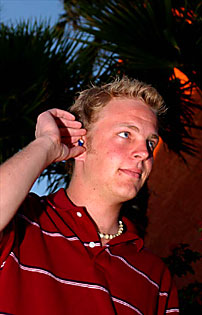 |
|
CHRIS CODUTO/Arizona Daily Wildcat
|
Physiological sciences senior Peter Bowman lost his much of his hearing at the age of two due to chickenpox.
|
|
By Tessa Hill
Arizona Daily Wildcat
Monday May 5, 2003
Like many other children growing up, Peter Bowman caught chicken pox. Unlike other children, however, the virus left him with more than a few scars.
At the age of 2, Bowman lost more than half of his total hearing capacity because the virus damaged several of his auditory nerves. The doctors said the damage was irreversible.
Now a physiological sciences senior, Bowman said he has relied on hearing aids, lip-reading and front-and-center seats in class to make it through four years of college.
"I rely mostly on reading lips," said Bowman, who said the biggest obstacles he has faced in the classroom were professors with thick accents or soft voices.
"I integrate (lip reading) with sounds I hear and then figure out what they are saying," Bowman added.
Although Bowman wears an invisible hearing aid to class and in other situations where it is especially important to hear clearly, his hearing loss requires neither interpreting services nor captioning devices, but patience and confidence.
 |
|
(Communication) is a huge part of our everyday lives, so you can imagine how difficult it can be at times
- Sue Kroeger
director, Disability Resource Center
|
 |
While Bowman has lived with his condition since childhood, other UA students just learned of their hearing irregularities this weekend during a free screening offered by the speech and hearing sciences department in honor of Better Speech and Hearing Month.
Thomas Muller, audiologist and clinical instructor for Speech and Hearing Sciences, was on hand at the event and said that although only a few of the estimated 200 attendees were students, hearing impairments can really affect the lives of students.
"(Students with hearing impairments) have pretty substantial difficulties," Muller said, adding that although hearing is perceived to be an age-related issue, hearing loss can affect anybody.
Muller said that a vast majority of the people, including students, who come to hearing screenings often fail because they come after they notice a change in their hearing.
But for some students who have already been diagnosed with a hearing impairment, hearing and speech services are crucial to their university experience.
The UA Disability Resource Center serves almost 50 students who are categorized as deaf or hard of hearing, with about 15 students who require sign language interpreters, according to Sue Kroeger, director of the Disability Resource Center.
"Communication can be a big barrier," Kroeger said, adding that although the Disability Resource Center can service students inside the classroom, some hearing impaired students sometimes feel isolated when they are outside the classroom without an interpreter.
"(Communication) is a huge part of our everyday lives, so you can imagine how difficult it can be at times" she said.
Kroeger also said that because English is considered a second language for many severely hearing-impaired students, writing can often be very challenging.
"It is somewhat of a dilemma because (hearing-impaired students) have unique barriers that others don't," Kroeger said. She added that many hearing-impaired students are encouraged to go to the Writing Center where they can get individualized help.
The Disability Resource Center offers several services for hearing impaired students, including sign language interpreters in the classroom, computer assisted real-time captioning, note takers and other accommodations based on individual need.
Bowman's hearing loss, which occurred suddenly, is not severe enough to require any of these services. But he does have difficulty, he said, with low-pitch sounds, such as whispering.
"If someone's whispering to me, I don't even try to understand them," he said.
Unlike Bowman, most people lose their hearing gradually and are still able to hear low-pitch sounds, Muller said, adding that those who lose their hearing gradually often become less able to hear high-pitch sounds such as background noise.
In addition to Bowman's decreased hearing capabilities, his speech has also been affected by his hearing loss.
"People always ask me if I'm from Boston, or where I'm from because they think I have a strange accent," said Bowman who speaks with a lisp because he never fully developed the ability to pronounce or hear the Īs' sound.
Despite the difficulties Bowman has faced thus far, he said his hearing aid actually helps keep his attention in class.
"I don't trail off in class very often with this thing in," he said, adding that before getting his current hearing aid before his sophomore year of college, he often struggled with understanding lectures and found himself getting further and further behind in class.
Although Bowman said his hearing has not decreased with age, he said he is aware of the possibility that when he is much older, he may lose his hearing all together.
"I'm afraid that when I'm 70, I'll be completely deaf and a hearing aid won't help," Bowman said. He added, however, that since his hearing loss was sudden, he remains optimistic that he may still be able to hear the same 50 years from now.

